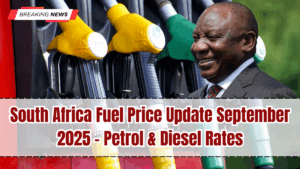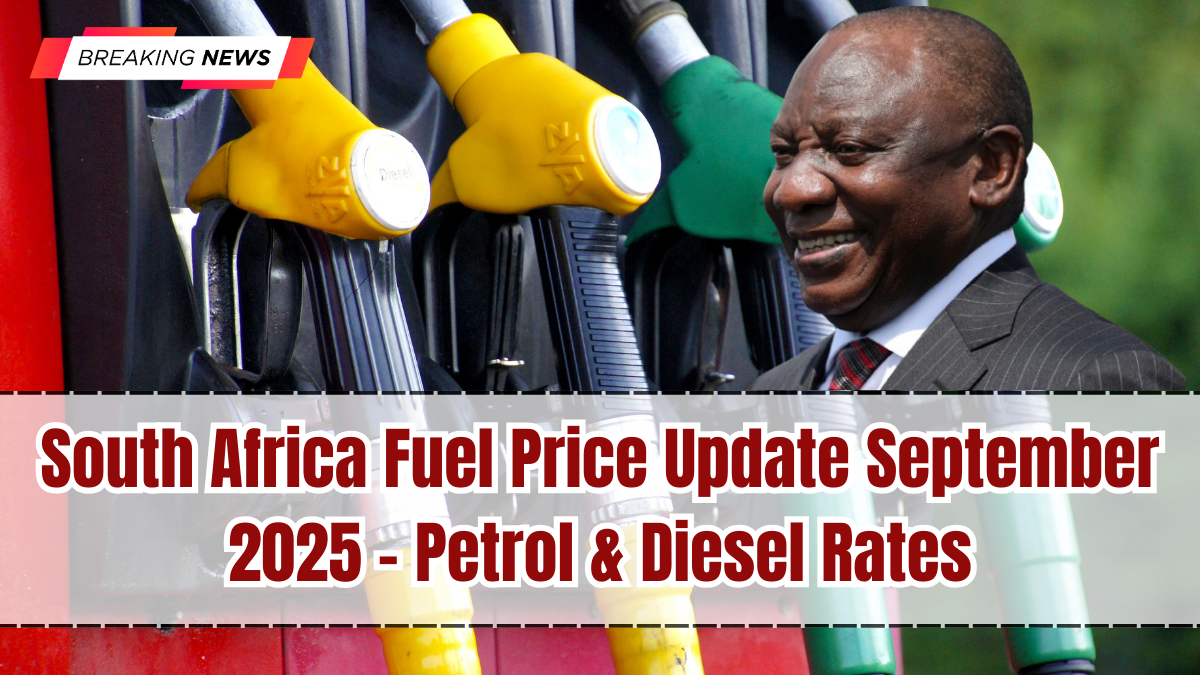The South Africa Fuel Price September 2025 update has once again hit motorists nationwide. The Department of Mineral Resources and Energy (DMRE) has confirmed changes to both petrol and diesel rates, effective from the first week of September.
For drivers, transport operators, and businesses, these changes mean one thing—higher costs on the road and at home. Fuel is not just about filling a tank; it affects food prices, transport fares, and overall inflation.
So, how much are the new rates, why are they changing, and what do South Africans need to prepare for this month?

What Are the New Fuel Prices in September 2025?
According to the DMRE, the latest pump price adjustments are as follows:
-
Petrol (93 Octane): Up by R1.15 per litre
-
Petrol (95 Octane): Up by R1.25 per litre
-
Diesel (0.05% Sulphur): Up by R0.95 per litre
-
Diesel (0.005% Sulphur): Up by R1.00 per litre
These changes apply nationwide, with slight regional variations due to transport and storage costs.
Why Did Fuel Prices Increase This Month?
Several global and local factors pushed prices higher in September.
-
Rising Global Oil Prices: Brent crude averaged US$94–96 per barrel, the highest since early 2023.
-
Weaker Rand: The currency slipped against the US dollar, making imports more expensive.
-
Higher Refining Costs: Regional supply disruptions in Asia have added to the expense of refined fuel.
-
Local Demand: Increased domestic consumption during holiday travel season also contributed.
This combination left South Africa vulnerable to international price swings.
How Do the New Prices Compare to August 2025?
In August, petrol was already near record highs. With the new adjustment, motorists are paying over R25 per litre for 95 octane in major cities like Johannesburg and Cape Town.
Diesel, which powers trucks and buses, has also breached R23 per litre, straining logistics companies and public transport operators.
For households, the cost of transport and groceries is expected to rise again, adding pressure to already tight budgets.
What Does This Mean for Public Transport Users?
Commuters relying on minibuses, buses, and taxis will feel the impact almost immediately. Operators face higher diesel bills and are likely to pass the cost on through fare hikes.
Industry groups are already in talks with regulators about potential increases. For millions of daily commuters, this could mean spending hundreds of rands more per month just to get to work.
How Are Businesses Affected by the Price Increase?
The fuel price hike doesn’t just affect drivers—it affects the entire economy.
-
Logistics Companies: Higher diesel costs raise freight expenses for transporting goods across provinces.
-
Retailers: Delivery costs push up product prices in stores.
-
Small Businesses: Entrepreneurs who depend on vehicles, from couriers to food suppliers, face shrinking margins.
Economists warn that sustained fuel hikes could add 0.5%–1% to inflation by the end of 2025.
Are There Any Relief Measures Available?
The government has acknowledged the impact and is reviewing options.
-
Fuel Levy Suspension: A temporary cut in the fuel levy is being considered to ease consumer costs.
-
Targeted Subsidies: Relief programs for taxi operators and low-income households may be introduced.
-
Alternative Energy Push: Authorities are encouraging adoption of electric vehicles and solar solutions to reduce long-term dependence on imported fuel.
However, these measures take time to roll out, so motorists should prepare for continued strain.
How Can South Africans Cope With Rising Fuel Prices?
Drivers are adjusting in several ways.
-
Carpooling: Sharing rides with family, friends, or co-workers reduces daily costs.
-
Trip Planning: Combining errands into single journeys saves fuel.
-
Switching Vehicles: Some are trading in older, fuel-hungry cars for smaller, more efficient models.
-
Public Transport: Despite fare hikes, it remains cheaper for many than owning a vehicle.
Businesses are also adopting smarter logistics, like route optimization and bulk shipments, to minimize expenses.
Will Prices Keep Rising in the Coming Months?
Analysts warn that volatility will continue.
-
If crude oil stays above US$95 per barrel, October could bring another round of hikes.
-
A stronger rand could help ease pressure, but global demand remains high.
-
Seasonal shifts in consumption, especially during the holiday season, will also play a role.
Many believe South Africans will need to brace for high prices well into the end of 2025.
Conclusion
The South Africa Fuel Price September 2025 adjustment brings another painful rise for motorists and businesses. With petrol and diesel rates climbing once again, households face higher transport and food costs.
While the government is exploring relief measures, the reality is that South Africans will need to budget carefully and adopt smarter fuel-saving habits. Until global oil markets stabilize and the rand strengthens, high pump prices may be here to stay.
FAQs
How much did petrol prices increase in September 2025?
Petrol went up by R1.15–R1.25 per litre, depending on the grade.
What about diesel prices this month?
Diesel increased by R0.95–R1.00 per litre, pushing average rates above R23 per litre.
Why are fuel prices rising again?
Because of higher global oil prices, a weaker rand, and increased refining costs.
Will transport fares also increase?
Yes. Taxi and bus operators are expected to raise fares to cover higher diesel expenses.
Is the government offering any relief?
Possible measures include a fuel levy suspension, subsidies for operators, and long-term EV incentives.
Click here to know more.
